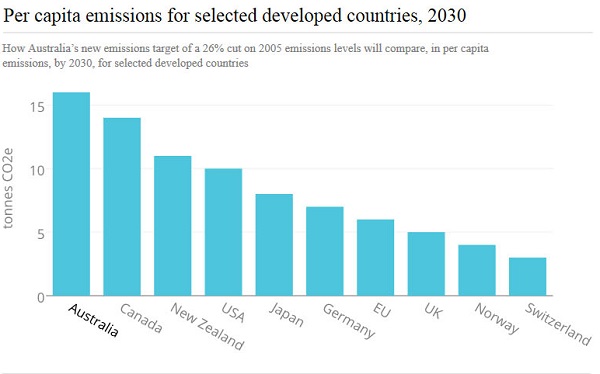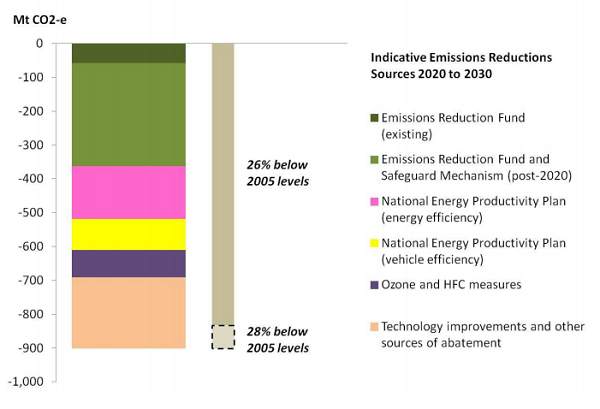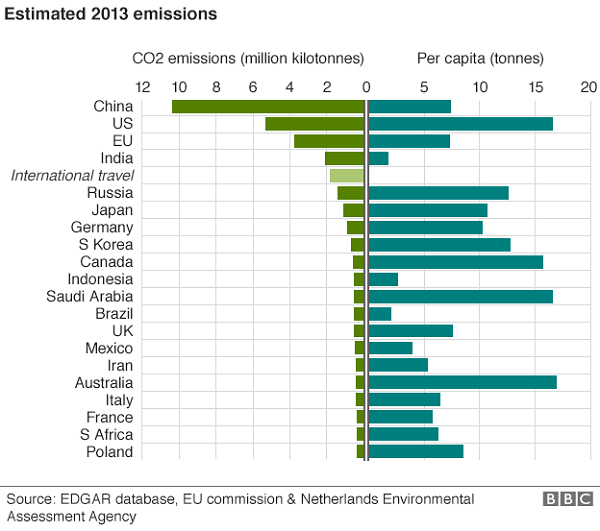Laura Tingle is wonderful when she loses patience. She reckons Abbott’s climate policy is “the dodgiest bit of public policy in recent years, possibly since the Coalition’s now infamous $11 billion hole in its 2010 election policy costings.”
She describes the policy a “rubbish” and says that the real target is the Labor Party. Abbott wants to argue that Labor would wreck the economy with higher electricity charges.
The target chosen for 2030 is a reduction of 26%, or perhaps up to 28%, on 2005 emissions. Using 2000 as the base year the reduction is only 19%, compared to the 40 to 60% recommended by the Climate Change Authority. On the face of it, the target is just ahead of Japan, which is struggling with a dodgy fleet of nuclear power stations, and just behind Canada and New zealand. Sophie Vorrath and Giles Parkinson cut the figures various ways. Abbott points to our population growth. The bottom line, though, is that we head the pack in emissions per capita. In 2030 will still win the per capita prize and have the most carbon intensive economy in the OECD.
This graph, from the Climate Institute via The Guardian, makes the point:

The US has promised cuts of between 26% and 28% by 2025, but if you take that trend forward it becomes about 41% by 2030.
Ben Eltham at New Matilda has published this graphic from the briefing which purports to show how the cuts will be achieved:

It’s mainly words, the only active policy in it is the Emissions Reduction Fund, where minister Greg Hunt told us on TV they were going to spend $200 million a year – a pathetically small amount. Laura Tingle says most of the emissions cuts are to come from policies unspecified and undeveloped:
- The majority of the emissions reduction, according to the government, comes from a safeguard mechanism (so far unspecified), a “national energy productivity plan” for energy efficiency (unknown) and vehicle efficiency (unknown) and “technology improvements and others sources of abatement”.
Then:
- The government is recklessly trading policy certainty for the business community for a cheap political shot at Labor.
It’s almost a hands off policy. No wonder Tony Abbott says his Government’s emissions reduction strategies will protect, not harm, the coal industry.
The Climate Change Authority will report by 30 June 2016 on the full suite of actions Australia should take to meet its commitments arising out of the Paris Conference. In this report the Authority will “present its analysis and recommendations on how Australia’s actual post-2020 targets might be most appropriately and cost-effectively implemented.”
That should hit the deck just before the next election.
Those who understand the science suggest that if everyone did what Australia intends to do we’d be in for 3 to 4 degrees of warming this century.
Labor has promised 50% renewable energy by 2030, but will not adopt a target for emissions reduction unless it can see the Government’s modelling. I do believe I heard that the Government will not release its modelling until 2017.
Meanwhile The Daily Telegraph had a front page spread claiming that Labor’s policies will cost the economy $600 billion. Hunt was waving it about in parliament. The story claims to have unearthed Treasury analysis from 2013 of the cost implications of the Climate Change Authority’s 40-60% target.
Abbott and company have a ready-made scare campaign drop into their lap. It talks of a carbon price of $209 per tonne and electricity increases of 78%. On the surface it looks loopy, but Labor would do well not to let it run.
This graph from EDGAR, via the BBC, puts our emissions into perspective:

Obviously what happens in China, the US, the EU and India will have a large impact on whether the world fries. Nevertheless there are 192 countries meeting in Paris, what everyone does counts. We are one of the leading emitters and of them the highest per capita. The Abbott Government’s approach is extraordinarily selfish and basically an “up yours” in terms of leadership. We will provide other laggard states with comfort and cover. We’ve done the bare minimum to avoid being a climate pariah at the Paris summit in December.


Rob Burgess at The NewDaily.
Burgess outlines what Labor is talking about – emphasising rooftop solar PV, batteries and decentralised electricity production.
We need to be careful about emissions figures. They are about emissions that occur within borders rather than emissions generated producing what is consumed within borders. So entities like the EU look good in part because it imports a lot of things that generated a lot of emissions elsewhere.
What seems to be missing in all these price figures is figures that put a value on the economic stimulation that would result from a serious campaign to drive down emissions.
What is also missing is a recognition that, once the loan is paid off, renewable energy is incredibly cheap. We should be looking at things like BOOT (build, own operate, transfer) schemes (or simply government schemes) that pay the loan off in say 10 yrs and then supply power at a rate that would make us a competitive aluminium producer.
There is simply no imagination coming from either side of politics.
John, the first comment about the source of emissions is a fair point. It makes the whole thing very difficult to monitor.
As to the vision coming from the major parties, Labor’s plans are very much a work in progress, the other mob are a joke.
John D:
Thanks, John. I was going to point out the “lie by omission” but you’ve put it more diplomatically. Honesty is in short supply on both sides of this debate.
Words of wisdom there, John D. hardly anyone anywhere has picked up on the important difference between emissions generated within borders and emissions caused by what ids consumed within those same borders.
26% ~ 28% by 2030 is a joke. Let’s outdo the Productivity Commission wish-list of up to 60% – and go for 70% ~ 80% and a lot sooner too.
When is it going to sink in that there are not only costs in emissions reductions but advantages as well – and by not taking the lead, regardless of what other countries do, Australia might be foregoing some of those advantages.
Under the following scenario;
a) Australia immediately stopped burning or mining any form of fossil fuel.
b ) China continues their promised increases.
Q) How many days would it take for Australias actions to be negated by Chinas ?
Jumpy, I’m sure the answer is not many, but it’s a rubbish argument. From memory, don’t quote me, China, the US and the EU make up something like half the emissions. As to the rest, everyone has to do their bit,
The Climate Change Authority was charged with working out our fair share. We go from there.
Brian,
In other words Australias reduction efforts are tokenistic and will make no practical or noticeable difference globally.
Our only chance to make any difference is to develop energy generation techniques , that are cheaper than fossil fuels, with which developing countries prefer to develop with.
All the rest is a wasteful sideshow.
How about we direct our scientific resources ( i.e. taxpayer dollars and brightest scholars ) toward fast tracking energy source/generation tech and away from the monitoring side of things ?
Lets face it, Scientist X that studies the CO2 effect on species Y (and there are 1000s of them. ) is not advancing the answers to solution.
Jumpy: The hard cold cash argument is that if we are in the lead on emissions reduction – and IF we are NOT nobbled by our we-can-prevent-innovation banks and by our-fraidy-cat corporate and government bureaucrats, as we usually are – we will have serious money roll in. Think of all the money we made from the export of innovative agricultural machinery and from biotechnology before the dumb-bunnies slammed on the brakes.
So it will be with emissions reduction: there will be some money to be made by being a world leader in emissions reduction: what we make ourselves and what we earn from licencing agreements …. but the real loot will come from what we discover by accident on the way to becoming world leaders. For example, who would of thought of cooking food by radiation but that’s what came out of wartime radar and microwave technology.
Really successful entrepreneurs understand the actual risks and the actual potential of serendipity and of the unknown and the untried …. that’s why the hostile reaction of the so-called business party to the opportunities of emissions reduction looks so damned silly.
Graham
Really successful entrepreneurs understand that focusing resources to new areas rather than wasting it on forensically detailing results of the past is a better way.
Steve Jobs changed the world in 5 years not by studying the inland telegraph route.
Sure, taxpayer funded snorkelling on the GBR studying Nemo is great, but is it the best bang for the technological buck ?
Or millions of dollars getting stuck for weeks in Arctic ice ?
And please don’t try to argue scientists can’t change their preferred field at the drop of a
granthat, that happens every day.Thanks for your considered opinions on this subject, Jumpy. It is good to see you bringing some common sense to the table.
Jumpy, we have to do it all. And too much of our current science is dependent on limited term grants. Scientists should be able to build a life rather than living from one pot of money to the next, or not.
But really, I want to go back to this:
Nor does me switching off lights, but it’s better that I do it. You could say that the efforts of every one of about 185 countries is tokenistic, but if no-one does anything half the job doesn’t get done.
Jumpy: I can understand how you feel but a lot of what happens in the Australian corporate world has more in common with the grandiose schemes of Nazis, the Fascists and The Stalinists than with good business – and medieval princes of the church would be green with envy seeing how many of our movers-and-shakers plunder our national treasure with absolutely no benefit whatsoever to the rest of us.
Adam Smith must be turning in his grave.
As you said, “Sure, taxpayer funded snorkelling on the GBR studying Nemo is great, but is it the best bang for the technological buck ?”, well, the same thing can be said for a lot of what is put up as “development” and as “job creation” projects.
Sending us all broke by protecting the owners of coal mines from economic reality and technological change is sheer folly.
Can you imagine the mess we would have been in if horse breeders had been give the same level of extraordinary PROTECTION against steam locomotives and internal combustion engines ?
GB
They were.
Yet despite this the market, both horse lovers and haters alike, embraced a superior technology that became cheaper and more efficient . That’s my point.
Capitalism overwhelmed protectionists.
Using scientific resources to realise a product that the masses decide has more value is your only hope.
Wasting scientific resources to guilt the masses into buying an inferior product is as much a folly as I can imagine and, again, will not work.
It’s pretty clear which avenue will yield results sooner.
Brian
If one as staunch as your self can’t shun, by 90%, fossil fuel and mining products then why should anyone else ?
Are you wearing 90% less petrochemical based fabrics?
You probably use 90% less petrol/diesel, why not 100% less.
Have you gone 90% coal free electricity ( impossible to go 100% due to the materials used and manufacturing methods) ?
Is your life petrochemical plastic free ?
Is your diet 90% less in production and transport emissions?
Have you made efforts to fart 90% less often ?
Are you waiting for Government to force you to do the above ?
Ok, in hindsight, my last was to broad.
Lets start with what you wore today.
I’m guessing cotton shirt and socks, denim jeans, plastic shoes and a flanny.
How’d i go ?
Jumpy’s got you there, Brian.
Mostly cotton and leather boots. I buy my clothes in a shop. What do you do?
I’m not a saint and won’t be around for too much longer. Don’t really have time for this sort of conversation, frankly.
My wife insists on buying my clothes, I can live with that.
No one is and yes you will.
But wouldn’t you rather see a scientific focus on the ” breakthrough ” as opposed to retrospective data collection ?
Jumpy, I think it is important to know what we don’t know. I’m not in a position to value one field against another, except to say that both are important in some measure.
Brian
Agreed.
And the knowledge that takes us forward is my preference, that’s all I’m getting at.
Another point I’ll note is that most leaps in tech were taken up by the mega wealthy first at mega cost initially.
And now my 12 yo niece has the same communication device as the Sultan of Brunei.
I would’ve thought Brian would minimise his carbon footprint by getting clothes from the Op Shop. Reduce, Reuse, Recycle as they say in Greensville.
Karen, my work clothes need to be functional and presentable, but coming to think of it the last jeans I bought were from an op shop.
I also tend to wear my clothes out.
Jumpy, questions like
contain bias in their conception and expression. Of course there would be a tendency to answer “yes”, but I won’t be drawn into that game.
Jumpy, to explain further, you’ve set up a binary, whereas the real world offers more alternatives.
Also you’ve set it up as an ‘either-or’ excluding the possibility of ‘both and’. Then the language you use favours one over the other.
Brian
I’m more than happy to have scientists monitor the effects of co2 on deep sea molluscs after the answers are discovered.
The heavy lifting in the pursuit for alternative energy sources and breakthroughs seems to be private sector. The brain drain away from them to government institutions to ” monitor ” is retarding progress.
For all the financial resources the IPCC and associated hangers on have gobbled up, they’ve produced nothing that helps. Yet Eberhard and Gate have made a physical difference with a fraction of the dollars.
Resource focusing is all I’m suggesting.
In a war the soldiers don’t choose their skirmishes, they are directed at the enemy.
Jumpy, I buy your last para in principle, just question whether you and I are well-placed to make a judgement.
It’s heartening to see Jumpy argue for any sort of action on climate change. It makes a change from, “It isn’t happening because we had extreme weather events a hundred years ago”.
zoot
I’ll put it in a statement for you to copy and paste it will.
” Climate change and global warming are happening “
Where we may differ is the results of it, quite frankly I can see a few upsides from it if it doesn’t go too far.
And cheaper energy sources ( wot I’m on about ) are less likely to come from a non-coal direction ( let’s face it, the efficiency gains now are tiny increments ) where as others have massive improvement ahead.
Actual pollution is also in my primate level calculations.
Ha!, I’ve double negatived on the coal thing.
Please remove either ” less ” or ” non- ” , not both if you want my intended meaning.
Karen, Jumpy and all:
1st. I’m a pensioner living as well as I can because I live frugally. Yet I am reasonably well-dressed, our furniture is robust and of decent quality, my bookcase groans under the weight of excellent books – mainly because I do take Reduce, Reuse, Recycle, Replant, Review and Reconsider very seriously by haunting charity shops and by all sorts of other thrifty acts. Living in The Other Australia, where public transport, among other things, is completely absent makes car ownership a vital necessity – however, I NEVER start the car without first asking myself, is this journey really necessary?
My own carbon footprint may well be one-twelfth that of the average city dweller. If I can do that – and thrive – then why can’t a lot of others tear themselves away from their obsessions with newness, fashion and instant gratification?
2nd. In case you haven’t noticed, I am hostile to the quasi-socialist Protectionism bestowed on the coal industry, the iron-ore industry and on oil industry. Our governmental and corporate decision-makers have learnt nothing, absolutely nothing, from the decades-long folly of allowing the Sheep to ride on Australia’s back.